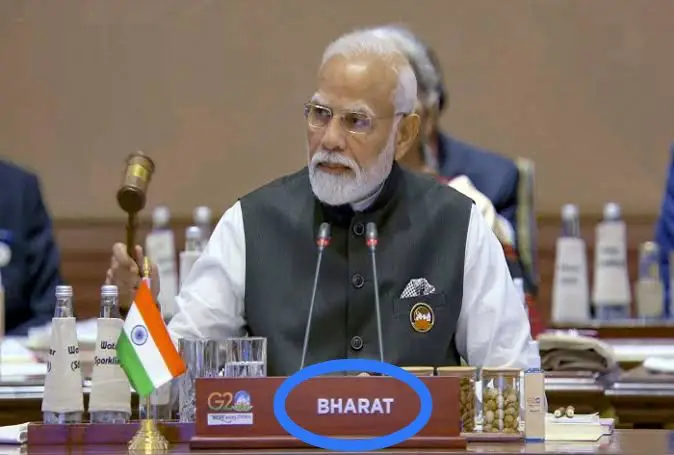India’s G20 Summit “Bharat”:
Bharat: On September 9, 2023, India hosted the G20 summit in New Delhi, drawing the attention of the world not just for the discussions among world leaders but also for a subtle yet significant change.India being referred to as “Bharat” during the summit. This move has ignited speculation about a possible name change for the nation. In this blog post, we delve into the details surrounding this development and its implications.

Table of Contents
The “Bharat” Reference
During the opening ceremony of the G20 summit, India’s Prime Minister, Narendra Modi, addressed the attendees with a placard that read “Bharat.” This marked a departure from the traditional use of “India” in such international forums. Notably, the G20 logo featured both names, with “Bharat” in Hindi and “India” in English.
Historical and Linguistic Context
The use of “Bharat” alongside “India” is not entirely new. In Indian languages, including Hindi, “Bharat” is often used interchangeably with “India” and its other pre-colonial names like “Bharata” and “Hindustan.” However, English has traditionally employed “India” for official titles such as “President” or “Prime Minister.”
Changing Terminology
What fueled the recent controversy was President Droupadi Murmu’s reference to herself as the “President of Bharat” in a dinner invitation to G20 leaders. This raised questions and triggered debates about the official nomenclature of the nation.
Historical Perspective
Supporters of the name “Bharat” argue that “India” was a name imposed by British colonizers. However, historians contest this claim, asserting that the name “India” predates colonial rule by centuries. The Rashtriya Swayamsevak Sangh (RSS), the ideological parent of the ruling Bhartiya Janata Party (BJP), has long advocated for the use of “Bharat” as the official name of the country.
Political Implications
Some political opponents of the BJP government contend that this shift in nomenclature is a response to the newly formed opposition alliance, INDIA (Indian National Developmental Inclusive Alliance), comprising 28 parties, which aims to challenge the BJP in the upcoming parliamentary elections.
Constitutional Changes
The most significant implication of this debate could be a potential amendment to Article 1 of the Indian Constitution. Currently, Article 1 states, “India, that is Bharat, shall be a Union of States.” The government might propose changes during a special session of Parliament from September 18-22, with the aim of officially adopting “Bharat” as the primary name.
The Global Response
The shift from “India” to “Bharat” has also elicited responses from the international community. Foreign leaders and diplomats attending the G20 summit took note of the change, sparking discussions on the diplomatic implications of such a move. Some see it as a reaffirmation of India’s cultural identity, while others are curious about how it might affect diplomatic relations and agreements conducted in English.
Cultural Identity and Unity
Beyond the political and diplomatic aspects, this debate reflects the deeper question of cultural identity and unity within India. The country’s diverse linguistic and cultural landscape often leads to a delicate balancing act between the coexistence of multiple languages and the promotion of a unified national identity. Whether “Bharat” becomes the official name or not, this conversation has prompted a renewed exploration of India’s rich historical and cultural heritage, emphasizing the importance of language, symbolism, and the nation’s evolution in a global context.
As the discussions continue, it is clear that this change goes beyond semantics; it represents a nation’s journey to assert its identity in a rapidly changing world while honoring its deep-rooted history and traditions. The coming days and weeks will shed more light on the direction India chooses to take, and the world will be watching closely. Stay tuned for further updates on this evolving narrative.
Conclusion
The use of “Bharat” at the G20 summit has reignited a long-standing debate about India’s official name. While this change could be seen as a return to pre-colonial roots and a reflection of cultural identity, it also carries political undertones. Whether this shift is merely symbolic or leads to constitutional amendments remains to be seen. The world watches as India, or “Bharat,” navigates this potential transformation, shaping its identity in the modern era.
To read more blog:https://www.reuters.com/world/india/modi-uses-bharat-g20-nameplate-not-india-amid-name-change-row-2023-09-09/
To read more:https://spotnews2023.com/index.php/2023/09/09/g20-summit-bharat-mandapam/


